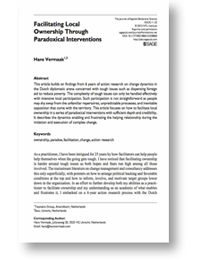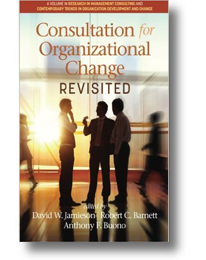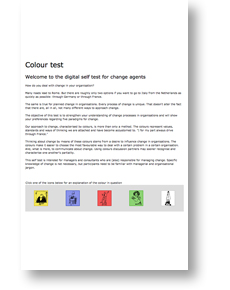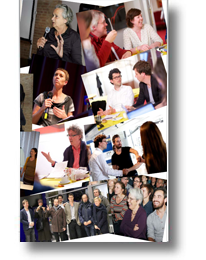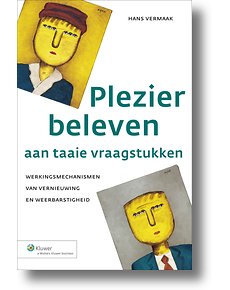This is the most up to date, complete and concise publication on the colors of change. It is written for both practitioners and academics that want to go beyond the basics. Those who already know about this change theory are likely to be surprised to find there is more to both the model and its applications Read more…
publications
The colors of change – revisited
In: R. Shani & D. Noumair. Research in Organizational Change and Development (vol. 26) - Emerald, 2018
Facilitating local ownership through paradoxical interventions
The complexity of tough issues can only be handled effectively with intensive local participation. Such participation is not straightforward as people may shy away from the unfamiliar repertoires, unpredictable processes and inevitable opposition that come with the territory. This paper focuses on how to facilitate local ownership in a series of paradoxical interventions with sufficient depth and credibility. Read more…
Democratization of change management
In 2018 four established consultants and change experts in their (late) thirties came to interview me for the Dutch national magazine for management consultants. (The Netherlands seems to have the highest density of such consultants in the world, by the way). They were looking for a good conversation about change as profession, democratization of change agents, professional standards and how to evaluate your own performance honestly Read more…
Learning to change
A guide for Organizational Change Agents
‘Learning to Change’ provides a comprehensive overview of organizational change theories and practices developed by both U.S. and European change theorists. The authors compare and contrast different approaches: five fundamentally different ways of thinking about change Read more…
Knowing yourself as a change agent
In: D. W. Jamieson, Barnett & A Buono (eds.) Consultation for Organizational Change Revisited - Information Age Publishing, 2016
This chapter presents a questionnaire that measures individual change preferences based on a meta-theory of five paradigms of change. We describe its construction and improvement over a 13-year period, during which time more than 100,000 people have used the test as an instrument for self-reflection.
Read more…
The color test for change agents
How do you think about change?
This is an interactive test that helps you identify your convictions about change. The test results can be used to assess what type of change agent you are: what you are good at and what could be developed further. Read more…
Epilogue
In: K. Kuitenbrouwer, T. Goudswaard, A. Schamineé. SocialDesignForWickedProblems - HNI, 2014
Since a few years visual artists and designers in the Netherlands have banded together with organizations to adress social issues in a different way. They focus on complex issues where sensemaking and participation is key. During the last half year or so three more action research projects were taken on with lost of enthusiasm. The movement reported on this October at the Dutch Design Week. Read more…
A springboard for further learning
In: S.M. Adams, A. Zenzi (eds.) Preparing Better Consultants: The Role of Academia. Information Age Publishing, 2011
The challenges consultants face warrant ongoing education. When those practitioners have 15- 30 years of experience dealing with messy realities, however, it makes little sense for faculty to teach clean-cut models in standardized curricula. Read more…
Book summary ‘Enjoying tough issues’
Dynamics of innovation and stagnation
There is no shortage of tough issues: whether it is collaboration between professionals, external oriented government, sustainable economy or development cooperation. They are characterized by complexity of different kinds: many factors and many actors are involved. It makes tough issues hard to pin down and impossible to eradicate. The dominant change repertoires are ill equipped for tough issues: clear division of tasks and responsibilities, minimizing conflicts, drawing up organizational missions, rolling out large-scale change programs Read more…





